Are you looking to unleash the full potential of Salesforce for your business? With its robust capabilities, Salesforce offers two powerful solutions - Sales Cloud and Service Cloud. But which one is the right fit for your specific needs? In this blog, we'll dive into the key differences between Sales Cloud and Service Cloud, helping you make an informed decision.
Sales Cloud is designed to boost your sales team's efficiency and productivity. It provides a comprehensive set of tools for managing leads, closing deals, and automating sales processes. If your primary focus is on driving revenue and accelerating sales cycles, Sales Cloud might be the perfect solution for you.
On the other hand, Service Cloud is geared towards delivering exceptional customer service experiences. It offers a range of features to help your support teams provide fast and personalized support across multiple channels. If your goal is to build strong customer relationships and enhance customer satisfaction, Service Cloud could be the ideal choice.
By understanding the unique strengths of each solution, you can determine which one aligns best with your business goals. So let's explore Sales Cloud and Service Cloud in more detail so you can unlock the full potential of Salesforce for your organization.
An Overview of Sales Cloud & Service Cloud
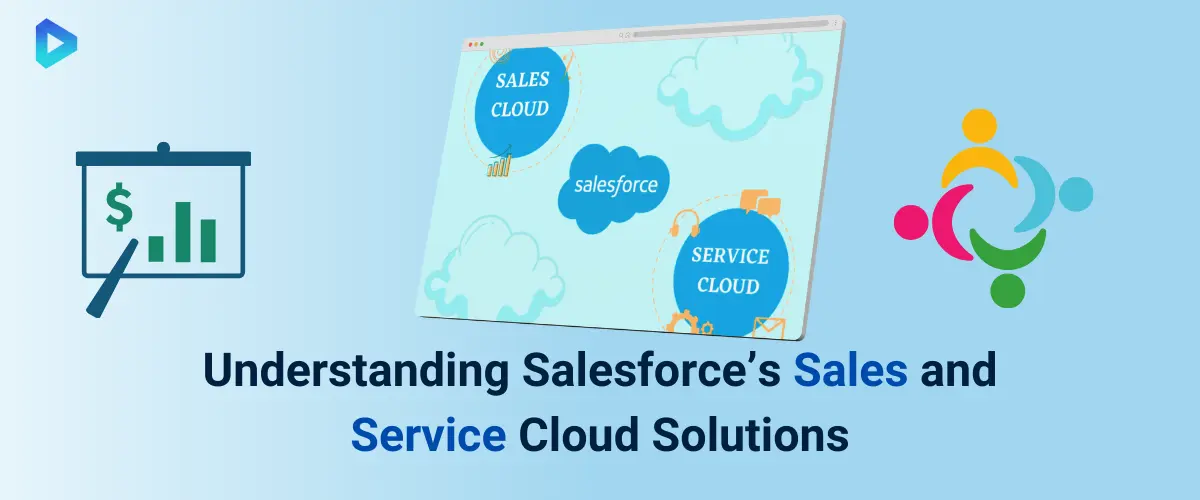
Salesforce's Sales Cloud and Service Cloud transform sales and customer service operations.
What Are Sales Cloud and Service Cloud?
Salesforce’s Sales Cloud and Service Cloud are innovative platforms designed to meet distinct business needs. Sales Cloud focuses on sales process optimization, offering tools for lead tracking, sales forecasting, and pipeline management. In contrast, Service Cloud enhances customer support by providing features like case management, knowledge bases, and live chat capabilities.
Together, these solutions streamline workflows, foster team collaboration, and improve customer satisfaction. Whether your business prioritizes sales growth or exceptional service delivery, understanding these platforms' core functionalities is key to leveraging their full potential.
Key Differences Between Sales and Service Cloud
While both Sales Cloud and Service Cloud drive business efficiency, they cater to different objectives. Sales Cloud supports sales teams by automating lead-to-opportunity conversions and improving revenue tracking. Service Cloud, on the other hand, empowers support teams to resolve customer issues quickly and effectively.
The former emphasizes sales cycle management, while the latter prioritizes customer retention through service excellence. Choosing the right solution depends on whether your focus is on achieving higher sales or enhancing customer experiences.
Why These Solutions Are Essential for Businesses
In today’s competitive market, businesses require robust tools to stay ahead. Sales Cloud and Service Cloud are pivotal in driving growth and building customer loyalty. Sales Cloud accelerates revenue generation by refining sales strategies, while Service Cloud ensures seamless customer interactions through enhanced support systems.
Together, these solutions provide a holistic approach to managing customer relationships, optimizing business operations, and achieving long-term success. Implementing them enables businesses to adapt to changing market dynamics and maintain a competitive edge.
Understanding Salesforce Sales Cloud and Its Applications

Salesforce Sales Cloud revolutionizes sales processes with tools for better productivity and business growth.
What is Salesforce Sales Cloud?
Salesforce Sales Cloud is a customer relationship management (CRM) platform designed to enhance sales team performance. It provides comprehensive features, including lead management, opportunity tracking, sales forecasting, and customer insights.
The platform supports seamless collaboration, enabling sales teams to engage customers effectively and close deals faster. Its user-friendly dashboards and reporting tools simplify data-driven decision-making, making it ideal for businesses aiming to streamline their sales processes. Sales Cloud caters to diverse industries, offering customizable solutions that adapt to unique sales strategies.
How Sales Cloud Supports Sales Team Productivity
Sales Cloud empowers sales teams by automating repetitive tasks, freeing time for high-value activities. Its lead prioritization feature helps sales reps focus on prospects with the highest potential, while AI-driven insights provide actionable recommendations for engagement strategies.
Collaboration tools like Chatter enable team members to share information in real-time, fostering a unified approach to achieving targets. Additionally, mobile accessibility ensures productivity remains uninterrupted, allowing teams to manage workflows and track performance on the go. This results in improved efficiency and consistent revenue growth.
Industries That Benefit Most from Sales Cloud
Sales Cloud serves industries with dynamic sales operations, including retail, manufacturing, technology, and healthcare. Retailers leverage its features for personalized customer engagement and inventory management, while manufacturers use it to manage B2B client relationships.
Technology firms gain a competitive edge through data-driven sales insights, and healthcare providers streamline patient relationship management. The platform’s adaptability makes it an invaluable tool for any organization looking to enhance sales strategies and maintain long-term customer relationships across varied sectors.
Features and Benefits of Salesforce Sales Cloud
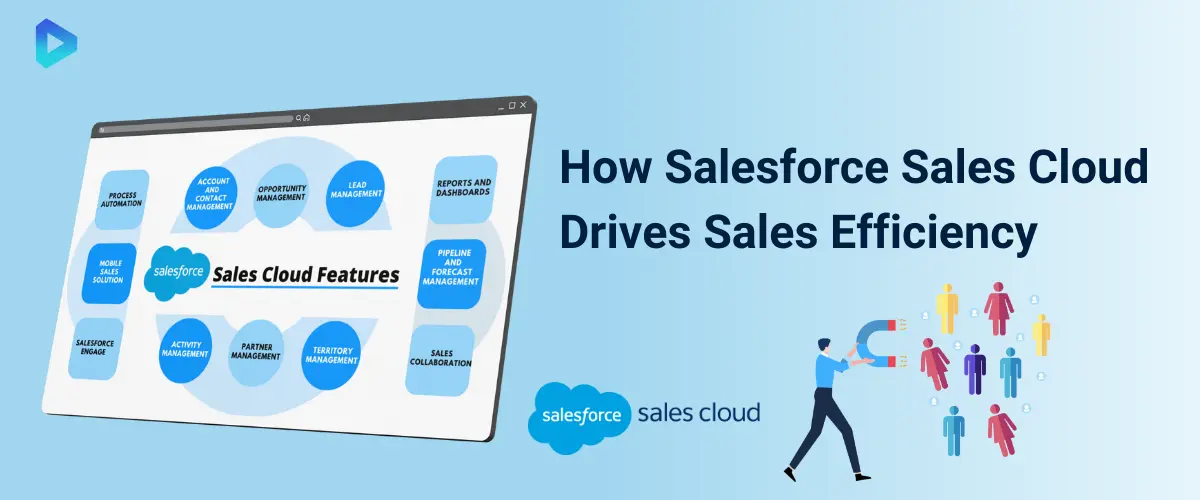
Salesforce Sales Cloud provides advanced features that transform sales processes for measurable business success.
Top Features of Salesforce Sales Cloud
Salesforce Sales Cloud offers a range of powerful features tailored to drive sales growth. Its lead management system streamlines the process of capturing, tracking, and nurturing prospects, while opportunity management helps sales teams monitor deal progress. Advanced sales forecasting tools provide accurate predictions, enabling businesses to plan effectively.
Customizable dashboards and detailed reporting offer clear insights into sales performance. Mobile access allows teams to stay connected and productive anywhere, while AI-powered Einstein Analytics delivers actionable insights for smarter decisions. Salesforce Sales Cloud is a one-stop solution for improving workflow and achieving sales targets.
Key Benefits of Using Sales Cloud for Businesses
Salesforce Sales Cloud significantly enhances business operations by offering tools that streamline processes and improve productivity. With its automated workflows, sales teams save time on repetitive tasks, focusing instead on customer interactions. Real-time insights help businesses identify and seize opportunities more effectively.
The platform fosters better collaboration, ensuring teams work cohesively towards shared goals. Additionally, its scalability ensures that as businesses grow, Sales Cloud adapts seamlessly. By delivering personalized customer experiences, it drives higher satisfaction and loyalty, which translates to sustained revenue growth for organizations.
How Sales Cloud Enhances Sales Automation and Efficiency
Sales Cloud revolutionizes sales operations by automating key processes and boosting efficiency. Its automation features handle tasks such as lead assignment, follow-up scheduling, and email communication, reducing manual effort. AI-powered tools, like Einstein Analytics, provide tailored recommendations to sales reps, optimizing engagement strategies.
Integration with third-party apps and tools ensures a cohesive ecosystem, simplifying data access and management. The intuitive interface ensures quick adoption, enabling sales teams to spend more time closing deals and less time on administrative tasks. This focus on automation ultimately drives faster deal closures and improved sales performance.
Understanding Salesforce Service Cloud for Customer Support
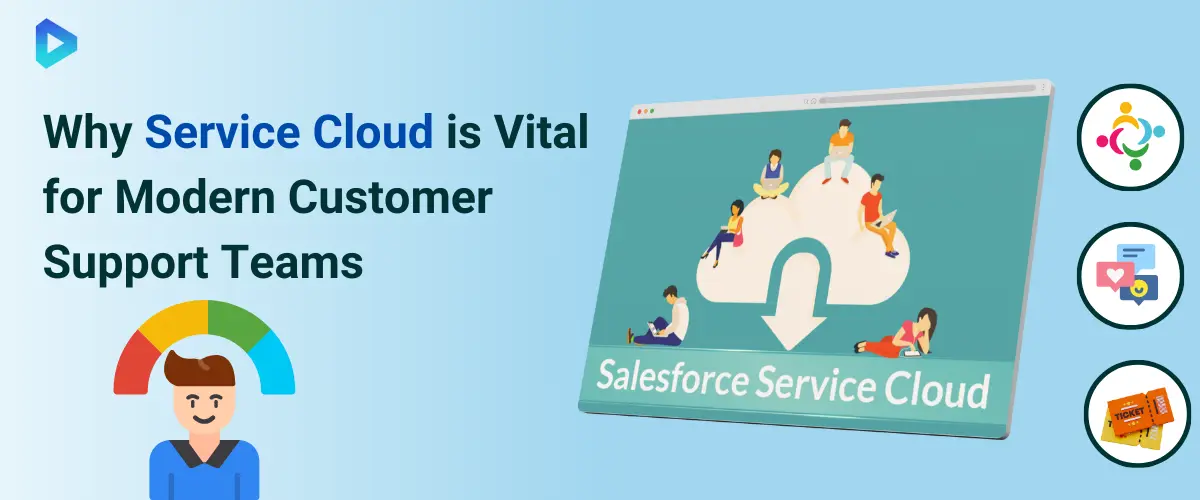
Salesforce Service Cloud offers dynamic tools to enhance customer experiences and optimize support operations.
What is Salesforce Service Cloud?
Salesforce Service Cloud is a comprehensive platform designed to transform customer service delivery. It integrates customer interactions across multiple channels, including email, chat, phone, and social media, into one centralized system. The platform empowers support teams with features such as case management, enabling agents to track and resolve customer issues efficiently.
Knowledge base integration ensures agents have instant access to solutions, while AI-powered Einstein Bots handle routine queries, freeing up team resources. With tools for automation, analytics, and collaboration, Service Cloud helps businesses provide personalized, fast, and effective customer support.
How Service Cloud Improves Customer Experiences
Salesforce Service Cloud revolutionizes customer experience by providing seamless and responsive support. Its omnichannel capabilities ensure that customers can connect with support teams through their preferred communication channels. Real-time analytics offer insights into customer behavior, helping agents anticipate needs and deliver proactive solutions.
The platform’s self-service portals empower customers to resolve issues independently, reducing wait times. By integrating AI and automation, Service Cloud personalizes interactions and improves response accuracy, leading to higher satisfaction. These capabilities not only address immediate customer concerns but also build long-term loyalty and trust.
Why Businesses Choose Service Cloud for Customer Support
Businesses rely on Salesforce Service Cloud for its ability to streamline support operations and enhance customer satisfaction. The platform’s scalability accommodates growing businesses, ensuring it meets changing customer needs. Its intuitive interface allows agents to resolve cases faster, boosting productivity and reducing operational costs.
Features like automated workflows and case routing minimize errors and delays, ensuring issues are resolved promptly. Additionally, Service Cloud's robust analytics provide actionable insights that drive continuous improvement in service quality. These factors make it a preferred choice for businesses aiming to deliver exceptional customer support.
Features and Benefits of Salesforce Service Cloud
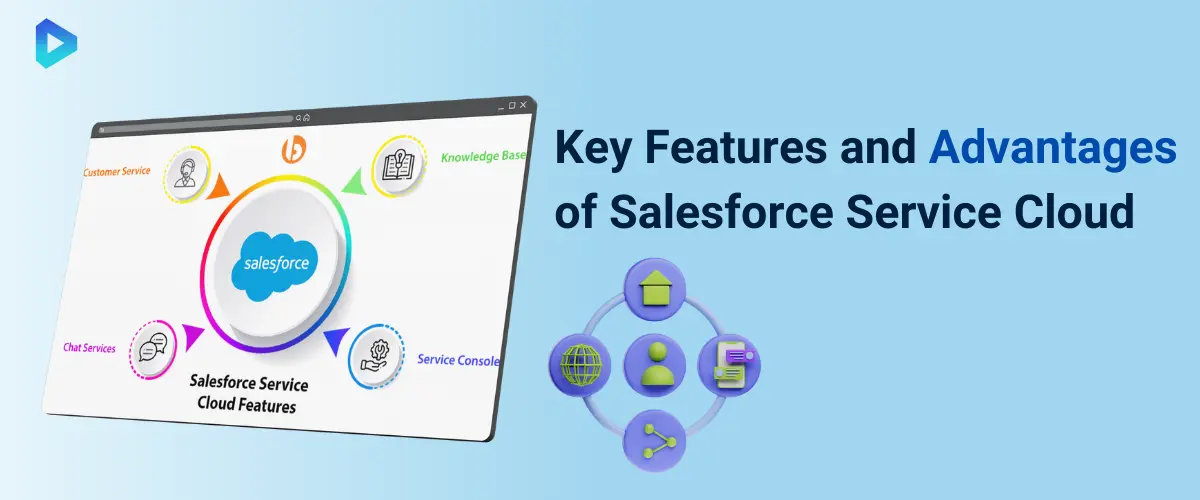
Salesforce Service Cloud offers essential tools for businesses to provide exceptional customer service and drive success.
Core Features of Service Cloud for Customer Success
Salesforce Service Cloud provides a suite of features designed to enhance customer service. Case management tools allow agents to prioritize and resolve issues efficiently. The knowledge base ensures consistent, accurate responses by giving agents quick access to helpful articles and FAQs. Its omnichannel support integrates interactions across chat, email, phone, and social media, ensuring seamless communication.
Einstein AI-powered features, such as chatbots and predictive analytics, automate routine tasks and identify customer needs. The platform also includes real-time dashboards and reports, which offer insights into service metrics, enabling data-driven improvements. Together, these features empower businesses to deliver efficient, personalized support that drives customer satisfaction.
Advantages of Using Service Cloud for Business Growth
Service Cloud equips businesses with tools to optimize operations and scale effectively. The platform enhances agent productivity by automating repetitive tasks, allowing teams to focus on complex customer needs. Its scalability supports businesses of all sizes, ensuring seamless adaptation as customer bases grow.
The omnichannel capabilities improve response times and reduce resolution effort, creating a more satisfying customer experience. By integrating AI and analytics, Service Cloud helps businesses identify trends, proactively address concerns, and improve service strategies. These advantages translate into greater efficiency, cost savings, and customer loyalty, fueling long-term growth.
How Service Cloud Enables Seamless Case Management
Case management is a cornerstone of Salesforce Service Cloud, providing businesses with an efficient way to handle customer inquiries. Cases are automatically routed to the right agents based on skills or availability, ensuring prompt and accurate responses. The timeline view offers a complete history of customer interactions, enabling agents to deliver personalized support.
Automated workflows ensure critical tasks are completed without delays, reducing manual effort and errors. Additionally, tools like real-time updates and mobile access allow agents to resolve cases anytime, anywhere. These capabilities ensure smooth, hassle-free case management, resulting in faster resolutions and happier customers.
Key Differences Between Sales Cloud and Service Cloud
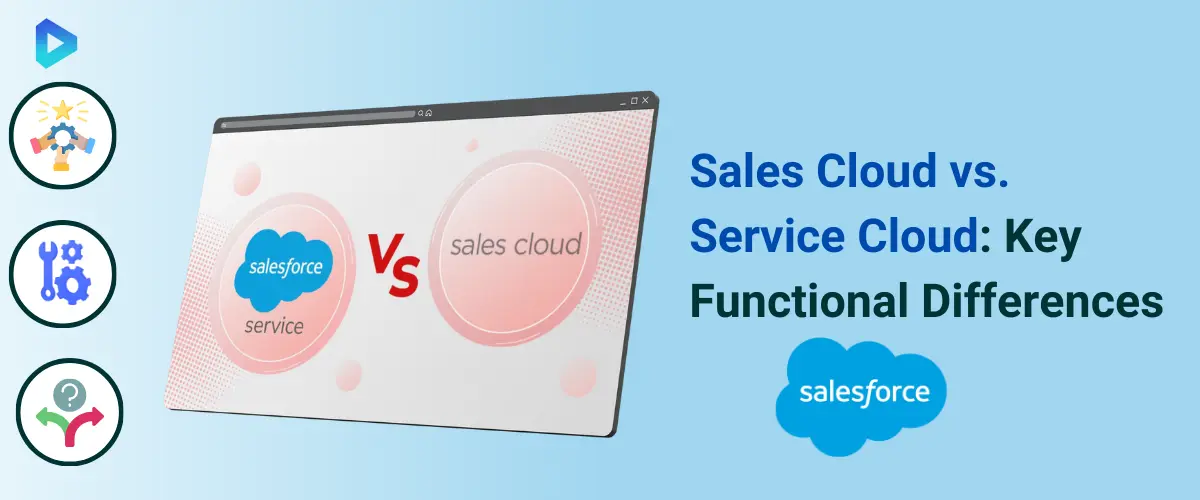
Salesforce’s Sales and Service Clouds are designed for distinct, essential business functions.
Comparing Features: Sales vs. Service Cloud
Sales Cloud focuses on empowering sales teams by offering features like lead management, opportunity tracking, and sales forecasting. It provides robust tools to manage sales pipelines, track customer interactions, and automate tasks, streamlining the entire sales process.
On the other hand, Service Cloud is designed for customer support teams. It includes tools like case management, knowledge bases, and omnichannel support to enhance service delivery. It also integrates AI-powered chatbots and analytics to improve customer interactions. While Sales Cloud drives revenue generation, Service Cloud ensures superior post-sale customer experiences. Understanding these differences helps businesses align their chosen solution with their operational goals.
Use Cases for Sales Cloud and Service Cloud
Sales Cloud is ideal for organizations focused on lead generation, sales process optimization, and pipeline management. It benefits industries like retail, real estate, and B2B services where sales teams need to track opportunities and meet revenue goals.
Service Cloud, however, is designed for customer service teams managing high volumes of inquiries. It’s widely used in industries like healthcare, telecommunications, and e-commerce, where providing quick resolutions and personalized support is critical. While both platforms offer analytics and automation, their applications differ based on whether the goal is to close deals or enhance customer satisfaction.
How to Decide Based on Business Objectives
Choosing between Sales Cloud and Service Cloud depends on your business priorities. If your main focus is boosting revenue, managing leads, and closing sales deals, Sales Cloud is the best fit. It centralizes sales data and improves team productivity.
Conversely, if improving customer satisfaction and managing service requests is your goal, Service Cloud offers the necessary tools. It streamlines case resolutions, ensures consistent support, and fosters loyalty. Some businesses may require both solutions for seamless sales and service integration, ensuring a well-rounded approach to growth. Assess your objectives carefully to decide which platform aligns with your vision.


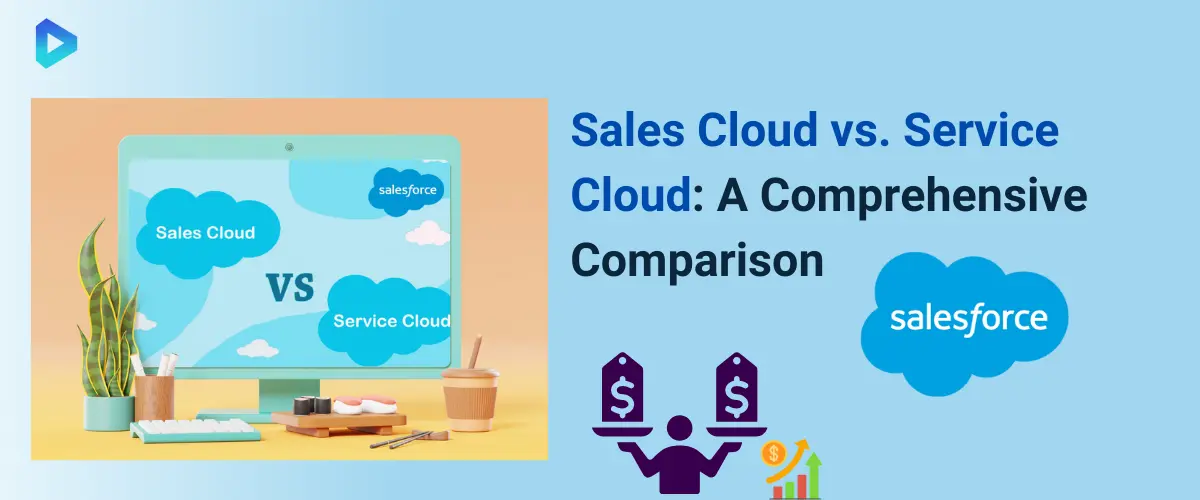

Let's Discuss Your Idea!
Send us your request using the form below.
Contact Info
Our contacts
Thank You!
We will respond to you within 24 hours.